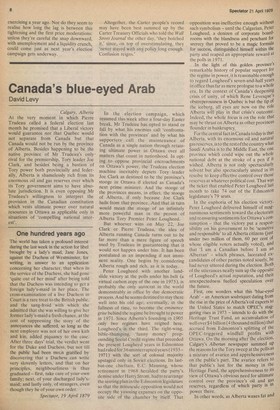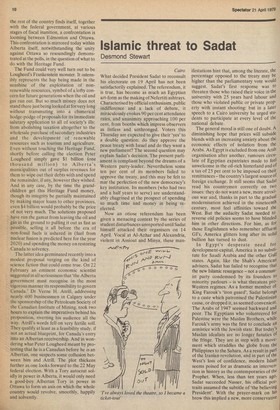Canada's blue-eyed Arab
David Levy
Calgary, Alberta At the very moment in which Pierre Trudeau called a federal election last month he promised that a Liberal victory would guarantee not that Quebec would not separate from Canada but that Canada would not be run by the province of Alberta. Besides happening to be the native province of Mr Trudeau's only rival for the premiership, Tory leader Joe Clark, and besides being a bastion of Tory power both provincially and federally, Alberta is shamelessly rich from its enormous oil and gas reserves over which its Tory government aims to have absolute jurisdiction. It is even opposing Mr Trudeau's willingness to interpret the provision in the Canadian constitution which vests ultimate power over natural resources in Ottawa as applicable only in situations of 'compelling national interest'. In the election campaign, which resumed this week after a four-day Easter break, Mr Trudeau has opted to stand or fall by what his enemies call 'confrontation with the provinces' and by what his supporters call the maintenance of Canada as a single nation through retaining ultimate power in Ottawa over all matters that count in nationhood. In opting to oppose provincial encroachments on Ottawa's power, the Trudeau election machine inevitably depicts Tory leader Joe Clark as destined to be the province's stooge in Ottawa if elected as Canada's next prime minister. And the stooge of the provinces means, in effect, the stooge of Alberta, if only because Joe Clark hails from that province. And that in turn would mean the stooge of an infinitely more powerful man in the person of Alberta Tory Premier Peter Lougheed.
But whoever wins on May 22, Joe Clark or Pierre Trudeau, the idea of Alberta running Canada turns out to be far more than a mere figure of speech used by Trudeau in guaranteeing that it would not happen under him. It has been postulated as an impending if not imminent reality. One begins by considering Alberta rough and rich, as it is today.
Peter Lougheed with another landslide victory at the polls under his belt (a virtual carbon copy of the one in 1975), is probably the only autocrat in the world demonstrably in office by due democratic process. And he seems destined to stay there well into his old age; eventually, in the fullness of time, to become the eminence grise behind the regime he brought to power in 1971. Since Alberta's founding in 1905 only two regimes have reigned here. Lougheed's is the third. The right-wing, bible-thumping, 'funny money' propounding Social Credit regime that preceded the present Lougheed years in Edmonton had ruled for 36 uninterrupted years (1935 — 1971) with the sort of colossal majority upstaged only in Soviet elections. Its lastbut-one chieftain, E.C. Manning, whose retirement in 1968 heralded the party's demise under Harry Strom, had to rearrange the seating plan in the Edmonton legislature so that the minuscule opposition would not occupy the yawning expanses on the opposite side of the chamber by itself. That opposition was ineffective enough without such symbolism — until the Calgarian, Peter Lougheed, a denizen of corporate board rooms with the blandness and penchant for secrecy that proved to be a magic formula for success, distinguished himself within the party and reaped an appropriate reward at the polls in 1971. In the light of this golden province's remarkable history of popular support for the regime in power, it is reasonable enough to regard Lougheed's seven-and-half years in office thus far as mere prologue to a whole era. In the context of Canada's deepening crisis of unity, of which Rene Levesque's obstreperousness in Quebec is but the tip of the iceberg, all eyes are now on the role Alberta will play in that crisis's outcome. Indeed, the whole focus is on the role that may be thrust on Alberta as other provinces flounder in bankruptcy.
For the central fact in Canada today is that Alberta, with its enormous oil and natdral gas reserves, is to the rest of the country what• Saudi Arabia is to the Middle East, the one province which could wipe out the whole national debt at the stroke of a pen if it wished. Alberta is not only spectacularly solvent but also spectacularly united in its resolve to keep effective control over those reserves at whatever political cost. That was the ticket that enabled Peter Lougheed last month to take 74 out of the Edmonton legislature's 79 seats.
In the euphoria of his election victory, Peter Lougheed delivered himself of mag nanimous sentiments toward the electorate and reassuring sentiments for Ottawa's consumption — that the victory put a responsibility on his government to be 'sensitive and responsible' to all Alberta citizens (just under two million of them, 60 per cent of whose eligible voters actually voted), and that 'I am a Canadian before I am an Albertan' — which phrases, lacerated excandidates of other parties noted sourly, he had never uttered during the election. Both. of the utterances neatly sum up the opposite of Lougheed's actual reputation, and their unexpectedness fuelled speculation over the future.
First, one wonders what this 'blue-eyed Arab' — an American soubriquet dating from the rise in the price of Alberta's oil exports to the United States to match OPEC's staggering rises in 1973 — intends to do with the Heritage Trust Fund, an accumulation of well over $4 billion (4 thousand million) that accrued from Edmonton's splitting of the OPEC-triggered windfall profits with Ottawa. On the morning after the election, Calgary's Albertan newspaper summed up the reasons for the Tory sweep at the polls as a mixture of avarice and apprehensiveness on the public's part. The avarice refers to that public's lust for the money in the Heritage Fund, the apprehensiveness to its view of Ottawa's obvious need for ultimate control over the province's oil and gS reserves, regardless of which party is In power there. In other words, as Alberta waxes fat and the rest of the country finds itself, together with the federal government, at various stages of fiscal inanition, a confrontation is looming between Edmonton and Ottawa. This confrontation is mirrored today within Alberta itself, notwithstanding the unity against Ottawa so resoundingly demonstrated at the polls, in the question of what to do with the Heritage Fund.
The Fund could very well turn out to be Lougheed's Frankenstein monster. It ostensibly represents the hay being made in the sunshine of the exploitation of nonrenewable resources, symbol of a lofty concern for future generations when the oil and gas run out. But so much money does not stand there just being looked at forvery long without transmuting into a chimerical hodge-podge of proposals for its immediate salutary application to all of society's ills: from abolishing taxation altogether to the wholesale purchase of secondary industries and the development of renewable resources such as tourism and agriculture. Even without touching the Heritage Fund, shortly before calling the election Peter Lougheed simply gave $1 billion (one thousand million) to Alberta's municipalities out of surplus revenues for them to wipe out their debts with and spend the remainder, if any, however they wished. And in any case, by the time the grandchildren get this Heritage Fund money, though its integrity be partially maintained by making major loans to other provinces, even $4 billion would probably be the price of not very much. The solutions proposed have run the gamut from leaving the oil and gas in the ground to pulling it out as fast as possible, selling it all before the era of non-fossil fuels is ushered in (fuel from nuclear fusion is predicted here for the year 2020) and spending the money on restoring Canada to solvency.
The latter idea germinated recently into a modest proposal verging on the kind of science fiction that could come true. On 22 February an eminent economic scientist suggested in all seriousness that 'the Alberta government must recognise in the most vigorous manner its responsibility to govern Canada.' Dr Verne H. Atrill, addressing nearly 400 businessmen in Calgary under the sponsorship of the Petroleum Society of the Canadian Institute of Mining, took two hours to explain the imperatives behind his proposition, rivetting his audience all the way. Atrill's words fell on very fertile soil. They qualify at least as a feasibility study, if not an actual blueprint, for Canada's entry into an Albertan receivership. And in wondering what Peter Lougheed meant by protesting that he is a Canadian before he is an Albertan, one suspects some collusion between him and Atrill. The plot thickens further as, one looks forward to the 22 May federal election. With a Tory autocrat solidly in power in Alberta, it would only need a good-boy Albertan Tory in power in Ottawa to form an axis on which the whole country would revolve, smoothly, happily and solvently.







































 Previous page
Previous page